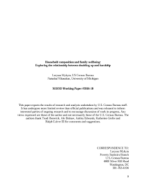Household composition and family well-being: Exploring the relationship between doubling up and hardship
Household composition and family well-being: Exploring the relationship between doubling up and hardship
Introduction
Despite the increased prevalence of doubling up, there has been little attention in the literature to the effects of doubling up on other measures of economic wellbeing like material hardship. In this analysis, we use data from the 2008 Survey of Income and Program Participation (SIPP) to examine the relationship between doubling up and material hardship (including a composite measure of hardship, housing, medical and utility-related hardships) as well as food insecurity. We estimate individual random-effects and fixed-effects models and find that doubling up is associated with lower levels (or log odds) of experiencing most types of material hardship. However, doubling up is associated with increased difficulty in accessing medical care and increased food hardship. Taken together, our results suggest that doubling up has varying effects on different types of hardship.




